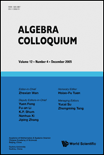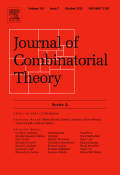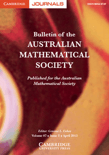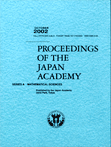
ARS Mathematica Contemporanea
Scope & Guideline
Unveiling the Future of Mathematical Sciences
Introduction
Aims and Scopes
- Graph Theory and Combinatorics:
The journal frequently publishes papers that delve into various aspects of graph theory, including topics like domination numbers, Hamiltonian cycles, and graph representations, reflecting a strong focus on combinatorial structures. - Algebraic Structures and Applications:
A significant number of articles explore algebraic concepts such as groups, rings, and fields, with applications to combinatorial designs and graph theory, highlighting the interplay between algebra and combinatorial mathematics. - Geometric and Topological Insights:
Papers often incorporate geometric and topological perspectives, addressing problems related to polyhedra, triangulations, and topological drawings, which enrich the understanding of mathematical structures. - Algorithmic Approaches and Complexity:
The journal includes research on algorithmic methodologies, addressing computational aspects of various mathematical problems, indicating an interest in the efficiency and practicality of mathematical solutions. - Interdisciplinary Connections:
There is an emphasis on bridging mathematics with other fields such as computer science and physics, showcasing the journal's commitment to fostering interdisciplinary research.
Trending and Emerging
- Fractional and Advanced Game Theory:
The emergence of papers on fractional games and advanced strategies indicates a growing interest in applying mathematical concepts to game theory, particularly in combinatorial and strategic settings. - Signed and Oriented Graphs:
Increasing publications on signed graphs and oriented graphs suggest a trend towards exploring new types of graph structures, with implications for network theory and combinatorial optimization. - Complexity in Combinatorial Designs:
There is a noticeable rise in research focused on complex combinatorial designs and their properties, reflecting a broader interest in the applications of combinatorial mathematics to various fields. - Algorithmic and Computational Mathematics:
A trend towards algorithmic approaches in mathematics, including computational complexity and optimization problems, highlights the importance of practical applications in contemporary research. - Interconnections with Algebraic Geometry:
Emerging themes involving algebraic geometry and its applications to combinatorial problems indicate a growing interest in understanding the geometric properties of algebraic structures.
Declining or Waning
- Classical Graph Theory Results:
There has been a noticeable decrease in publications focused solely on classical results in graph theory, such as basic properties and well-established theorems, as newer, more complex topics gain popularity. - Elementary Number Theory:
Research related to elementary number theory has become less frequent, possibly indicating a shift towards more complex algebraic structures and combinatorial applications rather than traditional number theoretic approaches. - Simplicity in Algebraic Structures:
Papers focusing on simple algebraic structures without deeper applications or connections to other mathematical areas are appearing less often, suggesting a trend towards more intricate and applied algebraic studies. - Static Geometric Problems:
There seems to be a decline in interest in static geometric problems, with fewer papers addressing classical geometry in isolation, as researchers increasingly explore dynamic or combinatorial aspects. - Historical Mathematical Studies:
Research that focuses on historical perspectives or analyses of classical mathematical texts is less prevalent, with a stronger emphasis now on contemporary applications and theoretical advancements.
Similar Journals

ALGEBRA COLLOQUIUM
Illuminating the Path of Mathematical DiscoveryALGEBRA COLLOQUIUM is a prominent journal dedicated to advancing the field of mathematics, specifically focusing on Algebra and Number Theory as well as Applied Mathematics. Published by World Scientific Publishing Co Pte Ltd, this journal is based in Singapore and has been a cornerstone in mathematical research since its inception in 1996, with an anticipated convergence through 2024. With an ISSN of 1005-3867 and E-ISSN of 0219-1733, it features rigorous peer-reviewed papers that cover a diverse range of topics within its scope. Reflecting its quality, Algebra Colloquium is ranked in the Q3 quartile in both Algebra and Number Theory as well as Applied Mathematics, indicating its significance amidst a competitive publication landscape. Researchers, professionals, and students looking to stay at the forefront of mathematical innovation will find a wealth of knowledge and research insights within these pages, making it an essential resource for anyone committed to deepening their understanding of algebraic concepts and techniques.

JOURNAL OF COMBINATORIAL THEORY SERIES A
Advancing the Frontiers of Combinatorial Insight.JOURNAL OF COMBINATORIAL THEORY SERIES A, published by Academic Press Inc. Elsevier Science, stands as a pivotal platform for researchers in the realm of combinatorial mathematics and theoretical computer science. With an impact factor that underscores its influence and a well-respected reputation reflected in its rapid ascent to Q1 rankings in discrete mathematics and computational theory, this journal serves as a critical resource for academics seeking to advance their understanding of complex combinatorial structures and algorithms.
Founded in 1971, the journal covers a wide spectrum of topics within combinatorial theory, providing a robust forum for innovative research and theoretical advancements until 2025. Including a strong position in the Scopus rankings—notably, it ranks #10 out of 92 in discrete mathematics—the journal is essential for both emerging scholars and established professionals committed to pushing the boundaries of mathematical and computational inquiry. Researchers are encouraged to submit their findings to this esteemed publication, as it offers a non-open-access model that ensures rigorous peer review and high visibility within the academic community.

BULLETIN OF THE AUSTRALIAN MATHEMATICAL SOCIETY
Showcasing Pivotal Research for a Brighter Mathematical FutureBULLETIN OF THE AUSTRALIAN MATHEMATICAL SOCIETY is an esteemed journal dedicated to advancing the field of mathematics, published by Cambridge University Press. Since its inception in 1969, this periodical has fostered scholarly communication and showcased pivotal research in various domains of mathematics, now projected to continue until 2024. With an impact factor that places it in the Q2 category of miscellaneous mathematics research, it holds a notable position among its peers, ranking 215th out of 399 in the Scopus database. Though it does not currently offer open access options, the journal remains a vital resource for researchers, professionals, and students seeking to deepen their understanding of mathematical advancements. The Bulletin serves as a crucial platform for disseminating original research, comprehensive reviews, and insightful perspectives that navigate the complexities of mathematics today, ensuring the community is well-informed and engaged.

PROCEEDINGS OF THE JAPAN ACADEMY SERIES A-MATHEMATICAL SCIENCES
Unveiling Innovations in Mathematical Sciences.PROCEEDINGS OF THE JAPAN ACADEMY SERIES A-MATHEMATICAL SCIENCES, published by the JAPAN ACADEMY, serves as a premier platform for disseminating original research in the field of mathematical sciences. Based in Japan, this journal has been a vital contributor to the global mathematical community since its inception, with continuous publication from 1996 to 2024. While it currently holds a Q3 ranking in the miscellaneous mathematics category according to the 2023 category quartiles, it provides an invaluable repository of knowledge that facilitates advancements in various mathematical disciplines. Although it is not an open-access journal, it remains widely regarded for its rigorous peer-review process, ensuring that high-quality research is presented to its audience. The journal is essential for researchers, professionals, and students eager to stay informed about novel developments and trends in mathematics. With an ISSN of 0386-2194, it aspires to foster collaboration and innovation within the mathematical sciences.

Acta Mathematica Universitatis Comenianae
Empowering minds with comprehensive insights into mathematics.Acta Mathematica Universitatis Comenianae is a distinguished journal dedicated to advancing the field of mathematics, particularly in its miscellaneous branches. Published by Comenius University in Slovakia, this journal provides a vital platform for researchers and scholars to disseminate their findings and engage with contemporary mathematical discourse. Despite being categorized in the fourth quartile for 2023 in general mathematics within Scopus, the journal plays an essential role in fostering academic dialogue and contributing to regional developments in mathematical research. The journal's scope includes a wide array of topics, ensuring contributions from various domains of mathematics are encouraged. With its commitment to publishing quality research, Acta Mathematica Universitatis Comenianae is an invaluable resource for professionals, students, and academics seeking to expand their knowledge and engage with a community of its peers.

Journal of the Ramanujan Mathematical Society
Celebrating the Art and Science of MathematicsJournal of the Ramanujan Mathematical Society, published by the esteemed Ramanujan Mathematical Society, serves as a vital resource for researchers and professionals in the field of mathematics. With an ISSN of 0970-1249 and an E-ISSN of 2320-3110, this journal specializes in disseminating high-quality research and advancements in various domains of mathematics, particularly those that echo the legacy of the renowned mathematician Srinivasa Ramanujan. Since its inception in 2006, this journal has evolved to embrace a diverse range of mathematical topics, striving for excellence as evidenced by its current Q3 ranking in the mathematics (miscellaneous) category for 2023. Although it is not an open-access journal, the Journal of the Ramanujan Mathematical Society remains a cornerstone for those engaged in the academic study of mathematics, as it appears in Scopus with a rank of #343/399. As it continues its publication journey towards 2024, the journal aims to foster a vibrant community of scholars and practitioners who contribute to the evolving landscape of mathematical research.

Journal of Combinatorial Algebra
Innovative Insights in Combinatorial AlgebraThe Journal of Combinatorial Algebra, published by the European Mathematical Society (EMS), is a pioneering open-access journal dedicated to advancing research in the fields of Algebra and Number Theory, as well as Discrete Mathematics and Combinatorics. Since its inception in 2018, the journal has been committed to promoting high-quality, rigorous research, evidenced by its 2023 scopus rankings placing it in the second quartile across both disciplines. It serves as a vital platform for academics, researchers, and students to share innovative findings, methodologies, and theoretical advancements within combinatorial algebra, facilitating collaboration and knowledge dissemination in the mathematical community. With its open access policy adopted in 2021, the journal ensures that its content is freely available to a global audience, further enriching the landscape of mathematical research. The journal's editorial board, composed of leading experts, guarantees the integrity and academic excellence of published articles, making it an essential resource for those engaged in the dynamic fields of combinatorics and algebra.

ACTA MATHEMATICA HUNGARICA
Exploring the Depths of Mathematical ExcellenceACTA MATHEMATICA HUNGARICA, published by SPRINGER, is a prestigious academic journal that has been a cornerstone in the field of mathematics since its inception in 1983. With a robust impact factor that reflects its relevance in the discipline, this journal occupies a notable position within the Q2 category in Mathematics (miscellaneous), ranking 167 out of 399 in Scopus for General Mathematics, placing it in the 58th percentile. The journal serves as an essential platform for disseminating high-quality research, offering insights into a diverse array of mathematical topics, including pure and applied mathematics. Although not an open-access publication, it ensures that the latest findings and methodologies reach a broad audience, contributing to ongoing discussions and innovations in the field. By maintaining a commitment to rigorous peer review and academic excellence, ACTA MATHEMATICA HUNGARICA significantly impacts the mathematical community and supports researchers, professionals, and students striving to advance their knowledge and expertise in mathematics.

Forum of Mathematics Sigma
Fostering collaboration in the world of mathematics.Forum of Mathematics Sigma is a premier open access journal published by Cambridge University Press that has been at the forefront of mathematical research since its inception in 2013. With a strong emphasis on advancing the fields of mathematics, the journal consistently achieves Q1 rankings across multiple categories, including Algebra and Number Theory, Analysis, and Computational Mathematics. This distinction highlights its impact and relevance within the scholarly community. The journal prides itself on providing a platform for innovative research, fostering collaboration among researchers and practitioners across various mathematical disciplines. Open access publication ensures that cutting-edge findings are widely available to readers globally, enhancing the dissemination of knowledge. With an address in the heart of Cambridge, England, Forum of Mathematics Sigma is dedicated to promoting high-quality research and making significant contributions to the development of mathematics.

Contributions to Discrete Mathematics
Fostering collaboration and discovery in discrete research.Contributions to Discrete Mathematics, published by the Department of Mathematics and Statistics at the University of Calgary, serves as a vital platform for disseminating innovative research within the dynamic field of discrete mathematics and combinatorics. Established in 2008, this journal has rapidly gained recognition, currently holding a Q3 classification in discrete mathematics and combinatorics for 2023. As it aims to foster academic dialogue and share groundbreaking discoveries, the journal showcases high-quality peer-reviewed articles that cover a range of topics, from theoretical explorations to practical applications. Although it currently operates under a traditional subscription model, there is a growing commitment to enhancing access options, ensuring that critical knowledge is available to researchers and practitioners alike. With its notable Scopus ranking of #50 out of 92 within its category, this journal is positioned as an important resource for students, academics, and industry professionals who seek to stay at the forefront of discrete mathematics research.